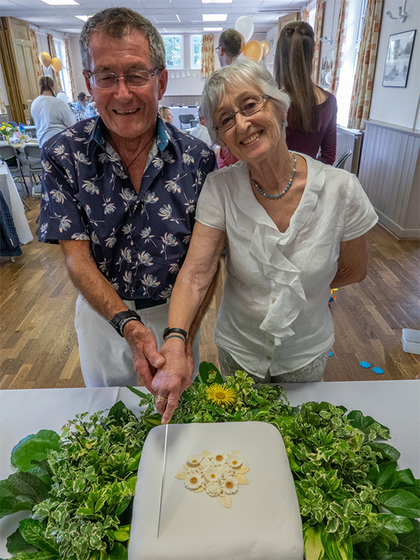Sue Arnold, a member of the Patient Network for Cambridge Cancer Research Hospital, tells us about her experience and cancer journey.
I moved to the Cambridge area in 1983 with my husband and our two young children. My relationship with Addenbrooke’s Hospital began in 1985 when, at the age of 37, I was finally diagnosed, after three years of unexplained symptoms, with severe, serum positive Rheumatoid Arthritis (RA), just as my mum had been at the age of 49.
Over the next 25 years I continued to have flare-ups and was treated with a number of drugs, including steroids. I had surgery to my hands and feet, steroid injections in my knees and, although I managed to continue teaching part time and caring for our children, I was frequently in pain and severely fatigued.
In late 2009/2010, now retired, yet another flare-up proved difficult to settle with the usual steroidal and non-steroidal drugs. I was offered anti-TNF therapy, the first of the new “biologic” treatments for RA, and was asked to take part in a trial. Part of the assessment for my suitability was a PET-CT scan in June 2010 which revealed a Diffuse Large B-cell Lymphoma at stage 1 in my left tonsil. This made me unsuitable for the trial and I was thrust into what every cancer patient will recognise as the whirlwind of tests, scans and appointments to determine my treatment. At this point RA was the least of my worries but what a silver lining to be diagnosed at stage 1, when the cancer could be successfully treated, because I had signed up for a clinical trial!
"I was thrust into what every cancer patient will recognise as the whirlwind of tests, scans and appointments to determine my treatment."
To cut a long story short, after six cycles of R-CHOP chemotherapy I was finally pronounced in remission and have remained so ever since. Not only that, but my RA was now amazingly well controlled and I discovered that a faulty protein on my B-cells had been responsible for both my RA and lymphoma. The chemo had reduced the number of circulating B-cells and thus eliminated my RA symptoms! I was therefore offered the monoclonal antibody Rituximab, which had been part of my chemo, to control my RA. It is delivered twice a year by infusion. Other than a tiny dose of an oral steroid this is all I need to be much more mobile at 75 than I was at 40!




After completing my treatment I was invited in 2012 to take part in a preliminary meeting to establish a Cancer Patient Partnership Group (CPPG) at Addenbrooke’s.
"This has developed into an effective voice for patient involvement in planning and delivering cancer services at Addenbrooke’s, known as co-production. This was my way of giving something back to the hospital which had saved my life and enabled me to know our grandchildren."
By then I was also a founder member of the Cambridge Lymphoma Support Group for which I have been the organiser since 2013.
In 2017 CPPG members were invited to a meeting to discuss a possible Cancer Research Hospital on the Addenbrooke’s site.
"I jumped at the chance and have felt privileged to be one of the patient representatives involved in planning a hospital which will not only provide an outstanding environment for staff and patients but will also facilitate interaction between clinical and research staff."




We anticipate that it will bring the lab bench to the bedside and enable suitable patients to benefit from appropriate trials as soon as possible. This is important to me as I now have a third B-cell condition which could progress to a blood cancer, Multiple Myeloma. And since I inherited the faulty CD20 protein from my mum, could my children and grandchildren inherit it from me? The research into the genetics of some cancers is a fascinating field which could well yield amazing new targeted treatments. In addition, my husband is now on active monitoring of his prostate cancer so we are both invested in the excellent cancer services at Addenbrooke’s.
If you, or someone you care about, have been treated for cancer at Addenbrooke’s, please consider joining the Cambridge Cancer Research Hospital Patient Network, you can find more information and sign up here.
"It has been a joy to work with patients and staff who are intent on making the dream of the Cancer Research Hospital a reality."
I am a member of the Patient Advisory Group for the Cancer Research Hospital working on the Communications and Engagement workstream and the Patient and Staff Diversity sub-group. I have also been involved in the planning of the ground floor area, outpatients and the day unit.